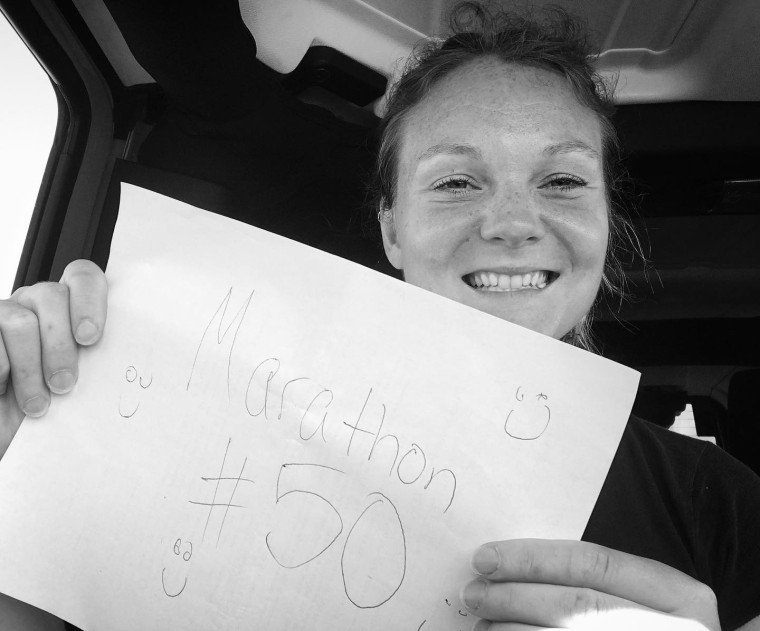When Alyssa Clark began running daily marathons in early 2020 as a way to cope with COVID-19 lockdowns, she had no intentions of setting a world record.
The 28-year-old high school teacher and professional runner was living in Italy, where her husband was assigned with the U.S. Navy, when the pandemic began.
"When we first began to go into the stages of self-isolation, I did not foresee we would be prevented from running or walking outside," Clark told TODAY Health, adding that as the coronavirus spread in Northern Italy, the government took "fast and necessary" measures to keep the rest of the country safe. "We went from being able to travel, run, walk freely, to being confined to our homes and only able to travel to and from work, the grocery story or hospital."
Clark, who has been a runner since high school, watched as all the races she had planned to run were canceled.
"I had been training for these races all winter and felt very prepared to compete, so I felt I needed something to test the fitness I had developed," she said.
After talking with her coach, Clark ran her first marathon on March 31, 2020 on a treadmill.
"We were supposed to have some restrictions lifted on April 14, so I thought I would do about 15 marathons," Clark explained. "But when it was extended to May 1, the game was on."
In Italy, the lockdowns kept extending and Clark kept running. According to Guinness World Records, she completed most of her runs in the morning, starting around 7:30 a.m. and finishing midday.
"I never went into it thinking I’m going to run 100 marathons," she said adding that she knew the record for consecutive marathons stood at 60. "So I took every marathon as a gift and I never took any of them for granted."

On May 10, 2020, Italian sanctions lifted and Clark, still feeling good, began running outside, but she had rules for herself.
"(I said) I will not put burden on the medical system by my running marathons," she shared. "I absolutely had a hard stop in pushing into an injury or illness."
Dr. Shawn Anthony, an orthopedic surgeon specializing in sports medicine at Mount Sinai in New York, told TODAY Health that there is "definitely increased risk of injury" with repetitive running, because there is not enough time to recover.
"Marathons and ultramarathon running takes a major toll on the body," Anthony told TODAY, adding that muscles, tendons, ligaments and cartilage all bear the brunt. "During the training, as well as running the marathon itself, there is muscle breakdown that requires a process of recovery after running."
In the midst of her daily marathons, Clark's husband was reassigned and the couple moved back to the United States. During the international move, she clocked miles around an Air Force base in Germany, Virginia, South Carolina and Florida, running 26.2 daily miles recorded by her Garmin.
"I never gave myself an out," Clark told TODAY. "I also tried to celebrate hitting milestones within the marathons and milestone marathons. Hearing others being inspired by my marathons was incredibly motivating for me to continue."
At the beginning of July, settled in her new home in Panama City, Florida, Clark began feeling sick.
"My chest was really tight and I lost my appetite," she said. "I was very determined that if I was putting myself at some kind of long-term risk health-wise — and that included putting a burden on the health care system — I was done."
After marathon 95, Clark's journey ended when she was diagnosed with COVID-19.
"I was sad that it was over, but I wasn’t disappointed that it wasn’t 100," she said. "The last one I completed, I ran with my husband. He ran the last 4 or 5 miles with me ... It ended the way it started — without any big fanfare."
Anthony told TODAY that Clark's diagnosis is not out of the ordinary.
"The immune system is also affected by intense running and it gets suppressed, so runners and elite athletes are at higher risk for colds and infections," he explained. "It stresses the importance of proper rest and recovery after intense exercise."
The Mount Sinai specialist said he typically recommends a 7- to 10-day recovery after long runs.
"You want to give the muscles and whole body time to recover," Anthony said.
On Aug. 11, 2021, after submitting "a whole lot of paperwork to make it official," Clark was named the women’s Guinness World Record holder for most consecutive days to run a marathon distance, a title previously held by Alice Birch of the U.K. with 60 marathons.
"I never thought about achieving a record," she said from her new home in Monterey, California. "I just was hoping to inspire people to take one step further than they thought was possible. I think it’s really important, especially for younger girls, to have role models to look up to ... I hope that this record is something that will be broken much sooner than later."

